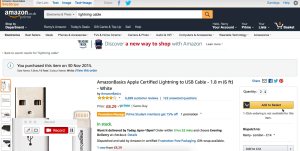This ecommerce strategy article is an excerpt from our new book, The Ultimate Ecommerce Email & SMS Playbook. We’re diving into our ecommerce strategy chapter focused on the 7 Reasons Why Ecommerce Customers Leave Your Brand.
Option 3: Become an Amazon Merchant
This option is more controversial. If you can’t beat Amazon, join Amazon, right? If acquiring customers is a priority for you, this could be a great option; Amazon’s flywheel does provide a lot of traffic for you to capitalize on.

Let’s take a look at this option for keeping customers loyal.
✓ Well, you certainly get traffic and benefit from Amazon’s scale. A good win there. You may have some challenges from competitors on the same website, but you definitely get eyeballs to tell your story.
✓ You’d benefit from Amazon’s search. The search traffic coming in is great for your business, and you could sell a lot!
❌ You definitely have no omni-channel experience because everything is on Amazon. The whole customer experience – even shipping the product (FBA) – is all owned by Amazon. Truly a faceless e-commerce experience, and you lose an opportunity to build a brand.

❌ You can take advantage of being a Prime customer, yet it may mean lower margins for you. If you can swing it, great, but generally, lower margins aren’t sustainable. And customers are expecting goods and services faster, so if you’re NOT a Prime seller, you lose out to the competitor who is. In addition, Amazon’s ‘Buy Now with Prime’ option on your website may be good for shoppers but not necessarily for your business (see the next reason). Overall, if you can’t make a healthy profit, you can’t stay in business.
❌ Amazon becomes the middleman. You rely on Amazon for everything you sell, ship, and restock. If Amazon likes you, you can sell on their marketplace. If you commit a single infraction, your business gets shut down. And if Amazon really loves you, they could copy your product and private label it under one of their hundreds of private label brands, like Amazon Basics. The Wall Street Journal called this out in the article below; Amazon scooped up data from its own sellers to launch competing products. Amazon ensures loyalty remains with them, the middleman, and not the brand.

❌ There’s zero customer data to export to you, so you can’t be customer-centric nor data-driven even if you wanted to. Not only do you not need it – since you’ve joined Amazon and primarily selling there, obviously! – Amazon has no incentive to help you sell directly to customers. These are Amazon’s customers, their market, their data, and their decisions.
❌ Finally, there’s no customer retention option. You barely have any way to communicate with your customers, in fact: masked email addresses, limited phone numbers, and a very transactional relationship. You’re fully focused on acquisition ads, and, well, other brands can do the same. Remember, there’s a reason why Nike delisted.
Joining Amazon is certainly the worst of the three options if you want to compete and keep customers loyal; the strategy fails on five out of seven checkboxes. If you’re trying to create a successful, profitable, and customer-intimate business that beats the competition, teaming up with Amazon ensures that never happens.
✓ Amazon’s scale guarantees sales and some story-telling
✓ Good opportunities for product personalization due to search
❌ Zero omni-channel experience, just Amazon experience
❌ You benefit from the value but lack community building
❌ Amazon is the middleman for the entire time
❌ You own very little customer data
❌ There’s no retention option, only acquisition ad spending
Maybe it passes the litmus test.
- Amazon does help level the playing field. Correction, you give up the playing field and concede the game to Amazon. But here’s an interesting statistic: brands on Amazon say that their biggest competitor is actually Amazon! Ironic; if you think the playing field was leveled, you just traded one competitor for another! Plus, you’re still competing against the same brands on Amazon as you were off Amazon. But for the sake of argument, we’ll say joining Amazon helps “level the playing field” in a bizarre way.

- You lose ownership of data and destiny. Guess what? It’s not your data anymore. It’s Amazon’s. Read your fine print; Amazon determines your destiny.
- You’re not investing your dollars smarter. You kind of just gave up, so any investments are Amazon-based. Traffic, search, and purchases are all dependent on Amazon’s algorithm. Even Amazon Advertising may not work as well with so much competition for space.
- Amazon doesn’t keep your customers loyal. They’re loyal to Amazon. End sentence. Period. Stamp it.
- Amazon won’t help you make a profit. Interestingly enough, 57% of brands still need and rely on their own website for sales. They can’t just rely on Amazon to make their numbers. If you’re a one-person operation, maybe you could swing to a profit, but brands like the ones reading this book may have a tough go at it.
Joining Amazon fails the litmus test. You’ve given up any chance of keeping customers loyal to your brand, mission, and products:
✓ Level the playing field
❌ Maintain ownership of data & destiny
❌ Invest your dollars smarter
❌ Keep customers loyal
❌ Generate profitable revenue
Three potential marketing strategies are down, and you’re not much closer to developing a plan to keep customers loyal. A social media strategy and a search strategy offer some areas of improvement yet not enough to truly remain competitive in the long run. Going the Amazon route indicates that you’ve truly given up and prefer to join the competition rather than go solo.
Now, let’s dive into the final strategy that the top e-commerce brands focus on to keep customers loyal in the face of steep competition.
Loved the article? Take one of these next steps:
